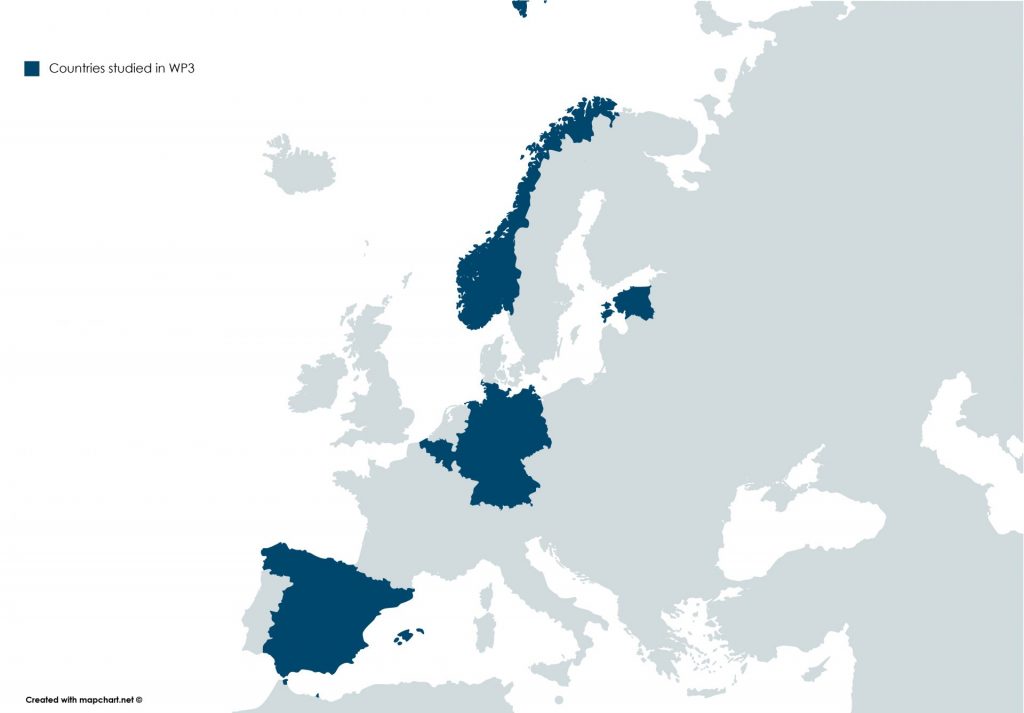Transformation of Individual Drivers and Barriers of Collaboration (Work Package 3 - WP3)
Led by KU Leuven (Belgium), this work package conducted research from August 2017 to September 2019.
The WP3 researchers investigated the attitudes, skills, knowledge, and incentives for individual actors involved in transforming collaboration, including civil servants, stakeholders, and users. The analysis covered several levels: public servants, collaboration partners (perceived ability, benevolence, and integrity), and collaboration type (policy design vs. policy delivery). It asked two related research questions:
- To what extent do local civil servants consider economic, environmental, social, and innovative criteria when awarding a contract to a company?
- How much are these criteria worth to local civil servants?
To answer these questions, the WP3 team conducted a series of discrete choice experiments in which realistic scenarios of collaboration were manipulated. They focused on:
- Local civil servants’ stated behaviour when awarding a contract to a company; and
- Policy delivery setting
Research
The WP3 team initiated its work with a preparatory review of the academic literature and exploratory in-depth interviews with public servants, to guide scenario design for a number of experiments. Pilot studies were organised in Estonia, Germany, Norway, and Spain, in order to test the different scenario designs and to choose the most efficient one. For the results of the pilot studies, see D3.1 Local Civil Servants' Stated Preferences When Collaborating. For the literature review, see D3.2 Research Report - Local Civil Servants' Stated Preferences When Collaborating.
A discrete choice experiment (DCE) was conducted with local civil servants responsible for waste collection at the municipal level. A discrete choice experiment is a stated preferences method that is used when individuals’ preferences for a particular product or service are not directly observable. Respondents were selected in the countries of the five participating partners, representing different administrative traditions. Country differences were analysed, based on findings generated in Work Package 2. The experiment examined the extent to which local civil servants consider economic, environmental, and social criteria as well as the ICT dimension when awarding a contract to a private company. It also measured how much these criteria are worth to them. Individual characteristics of the public servants were measured to explain variation in their willingness to collaborate, including their skills, knowledge, and incentives. For the design of the DCE, see D3.1. For the first results of the DCE, see D3.2 Research Report.
Following the study on local civil servants, the discrete choice experiment was replicated to examine politicians’ behaviour. It investigated whether Belgian politicians are driven by ideological or pragmatic reasoning when collaborating with private actors and analysed their incentives and attitudes. This study gave further insights on this type of collaboration and was a good opportunity to test and reflect on the suitability and applicability of the key findings on open and innovative collaborative practices from the previous experiment.
To further examine the conditions and practices of innovative collaboration in policy design involving public, private, and civil society actors and how user-knowledge is integrated in these processes, an additional study was conducted in Belgium. The survey analysed what motivated (incentives, skills, knowledge, and attitudes) more than 13 000 citizens-users of smart bikes in a large Belgian city to collaborate with the public sector in the coproduction of public services, using ICT tools.
Results and findings
Four main findings stand out from WP3. First, contrary to our expectations, local civil servants are willing to look beyond price, and take environmental, social, and the ICT dimension into consideration when collaborating with the private sector. Second, ideology matters when politicians collaborate with the private sector. Right wing politicians have higher preferences for the environmental and innovative criteria while left-wing politicians have stronger preferences for the social criteria. Three, citizens’ personal factors are associated with how they coproduce with private actors. Finally, motivations and ability are driving citizens’ coproduction behaviour.
Scientific publications
The Policy Brief When the Public Sector Chooses a Private Partner presents the main findings from the two discrete choice experiments and provides key insights about how public servants choose a private partner.
The WP3 team is currently working on several articles that will present the results from the experiments, to be published in high-ranking scientific journals.
The team
Led by KU Leuven (Belgium), this work package included Hertie School (Germany), Tallinn University of Technology (Estonia), University of Bergen (Norway) and University of Zaragoza (Spain).















